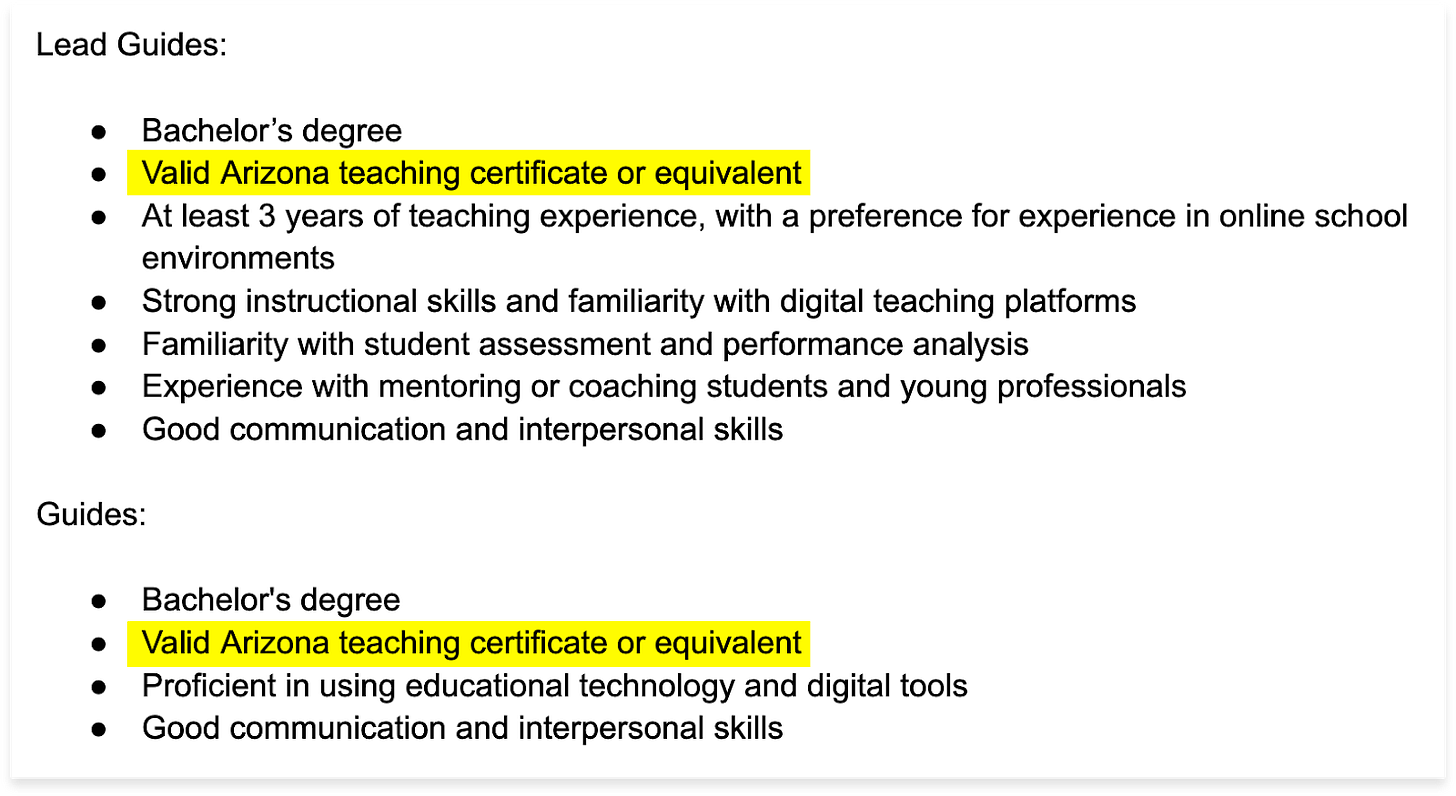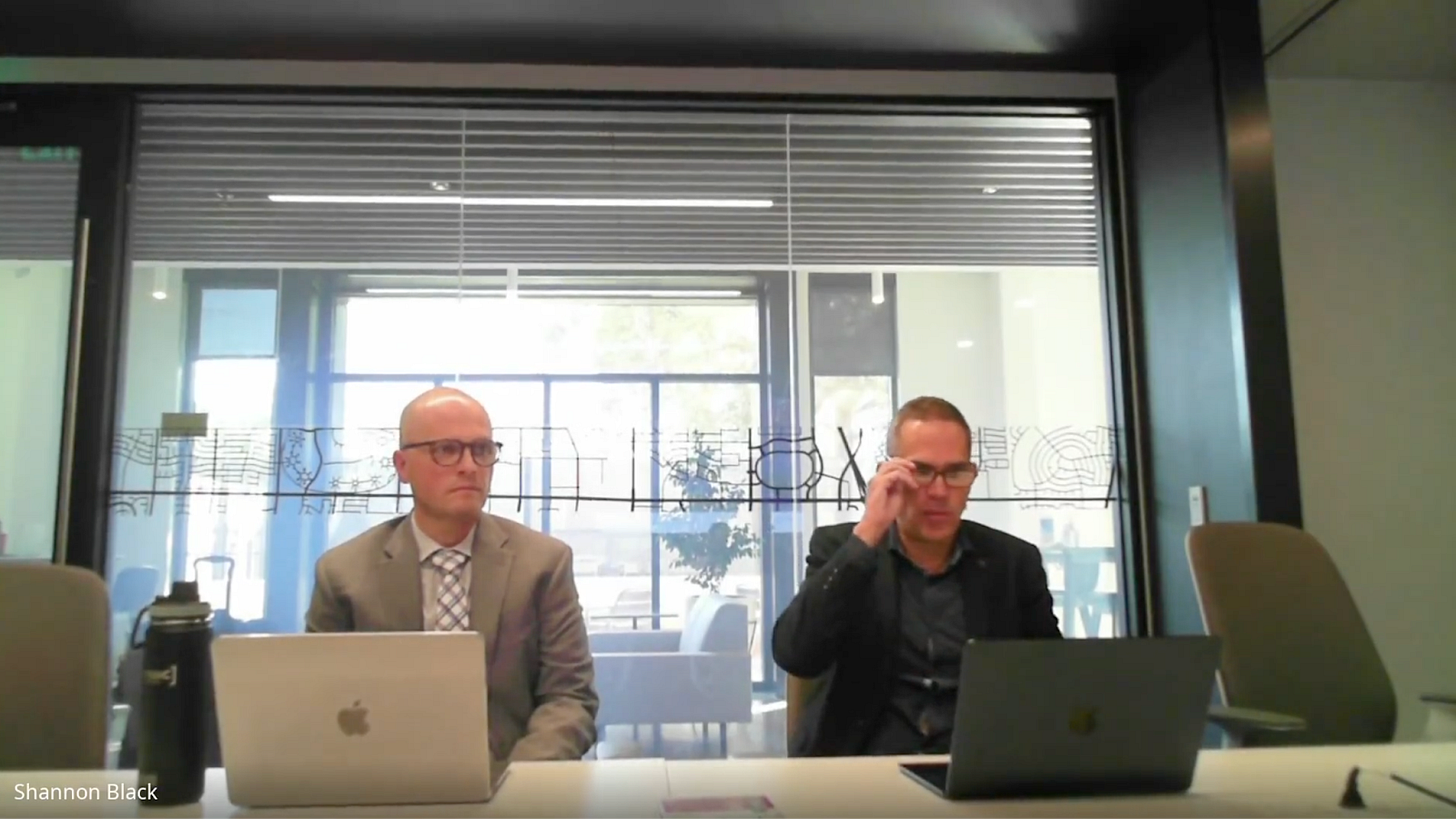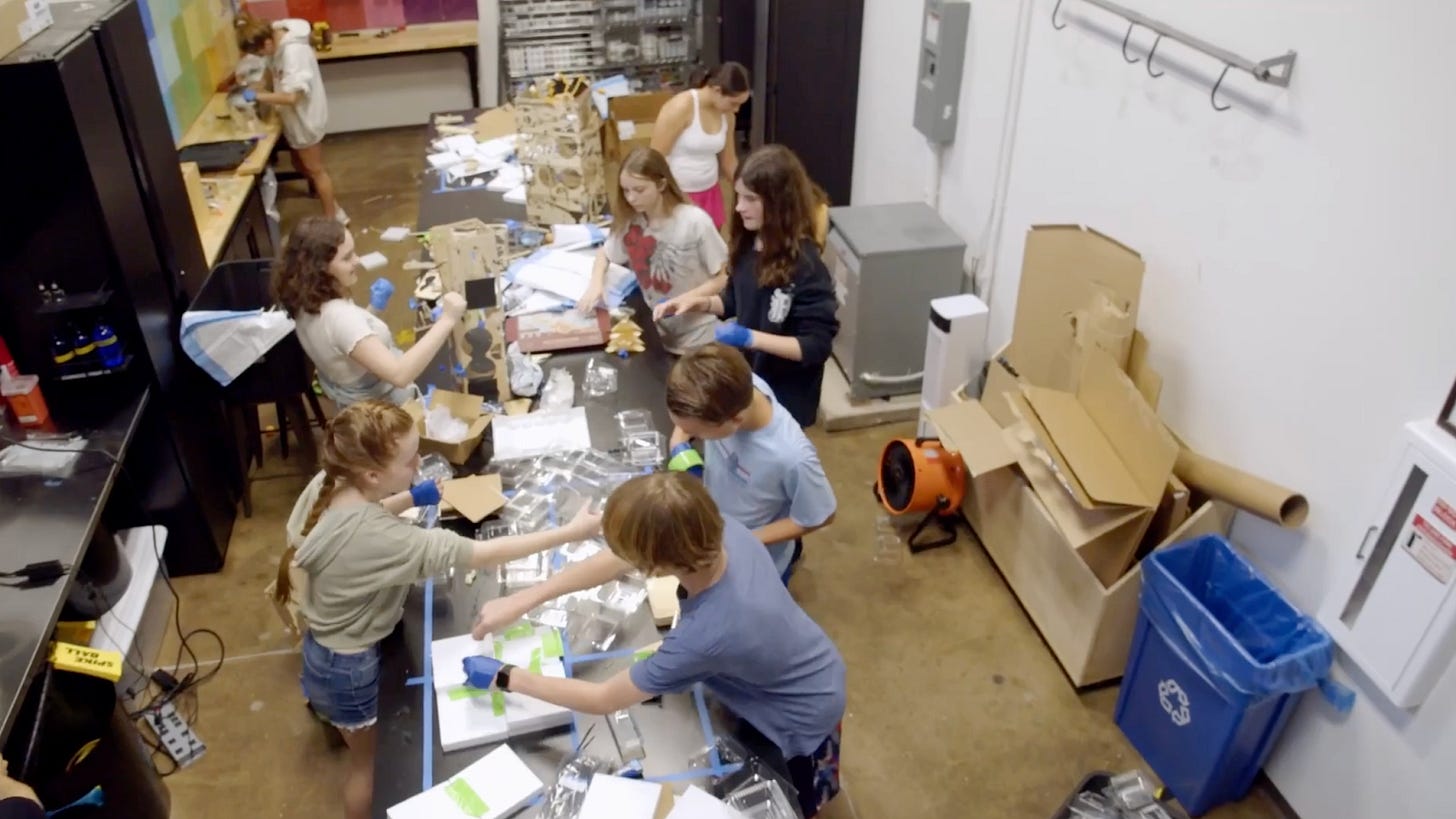The Truth About 2 Hour Learning, Unbound Academy, and Alpha School a/k/a The School “Replacing Teachers with AI”
They haven’t replaced teachers with AI. They have replaced poor kids with rich kids.
If you spent any part of your holiday scrolling the tech press on your phone, you doubtlessly saw headlines announcing that the Arizona State Board for Charter Schools approved a virtual charter school application for Unbound Academy. You could find this news in Vice, TechCrunch, Gizmodo, Popular Science, and other outlets.
Why the Tech Press Covered Unbound Academy So Extensively
There are two reasons why Unbound Academy’s charter application received so much more attention than the many other charters granted across the US in 2024.
One, because Unbound Academy implements what MacKenzie Price, its board president, calls “2 Hour Learning.” 2 Hour Learning is a program that promises for learning what “The 4 Hour Workweek” promised for your day job and “The 7 Minute Workout” promised for your fitness—more for less.
From its application:
By leveraging AI technology and personalized learning, 2hr Learning enables students to master core academic subjects in two hours daily, allocating the remainder of the school day for life skills development and pursuing personal interests. These life skill workshops mimic the collaborative, creative, interdisciplinary tasks that will be required of them in most post-secondary environments.
Two, because 2 Hour Learning claims it has replaced teachers with AI. From its whitepaper:
Classrooms that have no teachers; instead, students learn academics through an AI tutor on apps, providing each student with a 1:1, mastery-based academic journey and guaranteeing success. [..] There are no academic teachers; Guides motivate and support students as they become self-driven learners.
If true, Unbound Academy is a huge story, one that describes a massive disruption of a US education market worth $1T, most of which is currently spent on teachers. If Unbound Academy has replaced teachers with AI, it has done something the tech industry has tried and failed to do for the last two years: find a “killer app” for AI in an industry large enough to justify their billions of dollars of investment.
What the Tech Press Missed
Unbound Academy hasn’t replaced teachers with AI.
In its charter application, Unbound Academy describes the minimum qualifications for its “guides,” which, again, they claim are not teachers.
Right, so their guides are just teachers. Certificated teachers. Maybe there are fewer of them than you’d usually see in a school? Perhaps with AI making up the difference and generating cost savings? Again: no.
Guides use this rich data to provide proactive, targeted interventions and support. The guide-to-student ratio is 1:20 compared to 1:30 in typical schools.
Unbound Academy is employing more certificated teachers per student than “typical schools.” Certainly, it is deploying its certificated teachers differently than typical schools. But MacKenzie Price, abetted by the tech press, is understating the contributions of teachers and their expertise to her 2 Hour Learning model.
Unbound Academy is bigger than Arizona.
The tech press also missed the fact that Unbound Academy is “dedicated to launching a virtual online school in as many states as possible.” Arizona is not its first charter application. Unbound Academy has applied to operate virtual charter schools in Utah, Arkansas, North Carolina, South Carolina, Pennsylvania, and likely others.
Its applications were rejected in Utah, Arkansas, and North Carolina, but Unbound Academy is likely to submit a charter school application in your state at some point soon. After reviewing Unbound Academy’s application package in Arizona and other states, here are several questions I’d offer future school boards whenever you see their application.
Questions Charter School Boards Should Ask Unbound Academy
Where is the evidence of community demand?
Who is asking for this school? Where is the evidence of student and parent interest? In their application interview in Arizona (12:40), Unbound Academy board member Andrew Price claims that MacKenzie Price has “half a million social media followers and we have an analysis that says 10,000 or more of those are parents in Arizona.” But someone who follows you on Instagram and someone who wants to sign their kids up for your experimental model of schooling are, to put it lightly, not the same person.
This lack of community demand comes at a cost to students. To acquire applicants, Unbound Academy has budgeted $1,000 per student annually for marketing costs, funds they aren’t spending on student education. Charter boards should expect more evidence of pre-existing community demand.
How will these tuition-free schools get private school results?
Unbound Academy’s application claims:
At schools using 2hr Learning, students experience 2.4x the academic growth on average compared to peers in conventional classrooms, with the highest performing 20% of students achieving 6.5x growth.
But each of those “schools using 2hr Learning” are private schools in MacKenzie Price’s Alpha School network, each of which charges tuition—$40,000 per year in Austin, TX, for example—each of which can admit, expel, and counsel out students for reasons that are not legal in public schooling.
In their whitepaper, for example, 2 Hour Learning names a lack of student and parent engagement as “potential issues” threatening the success of its model. Applying a tuition filter in the admissions process—indeed, having an admissions process at all—does a great deal to ensure engagement from both students and parents. And if students or parents fail to engage beyond that early filter, private schools have much more freedom to remove them than public schools.
Where is Unbound Academy’s evidence that its model works for students whose families cannot afford private school tuition and cannot provide backup tutoring if two hours of pure app-based learning proves an inadequate education?
Unbound Academy claims in its application that 2 Hour Learning has strong results at the Alpha School campus in Brownsville, TX, which it claims “serves students from underprivileged backgrounds.” But that school still charges $15,000 per year for tuition, which is not a definition of “underprivileged” I am familiar with.
How will your virtual school get brick-and-mortar results?
Unbound Academy is a virtual charter school, a school model that sees such poor results compared to brick-and-mortar equivalents that the Walton Family Foundation, generally a stalwart friend of technology and charters, rebuked it.
Maybe Unbound Academy has figured out a solution, though. Certainly, it cites a lot of student love for Alpha School in its Arizona application:
At Alpha School, which uses the 2hr Learning model, students are asked every six weeks if they love school – 96% wholeheartedly do, with over 60% of those preferring school to vacation.
I have little doubt this love is genuine and I suspect a huge part of it is explained by the four hours per day that Alpha School students spend making pasta, climbing rock walls, building in a fab lab, flying drones, and generally doing cool stuff with their friends. It looks really fun.
But the most important elements here—expensive physical spaces and activities you share with friends you see everyday—aren’t easily adapted from a brick-and-mortar school to a virtual school. What evidence does Unbound Academy have that any of that love will translate from the physical to the virtual world?
Why aren’t you opening a brick-and-mortar charter school first?
Related to the above. It’s two big leaps from a brick-and-mortar private school to a virtual charter school. Why not take just one big leap first and open or partner with a brick-and-mortar charter school? Prove the 2 Hour Learning model in a tuition-free environment and then move online? (I imagine the answer here is something like “brick-and-mortar schools are much harder to run, with much greater risk, and much smaller margins,” but that is not our problem to solve.)
What proprietary AI are you bringing here at all?
Unbound Academy stakes many of its claims on the power of artificial intelligence, writing in their application:
We employ adaptive technology to tailor educational experiences through widely recognized platforms like IXL and Khan Academy, supplemented by custom content to address specific gaps. The AI rigorously analyzes comprehensive student data—response accuracy, engagement duration, and emotional feedback via webcam—to ensure lessons are appropriately challenging.
Is Unbound Academy just “AI washing” itself here, attaching itself loosely to the massive pre-existing marketing campaign for generative AI?
Yes, IXL and Khan Academy integrate different forms of AI, but neither of them claim anything like the results Unbound Academy has claimed. So what extra technology is Unbound Academy bringing? Its board members might describe, for example, how their AI analyzes “emotional feedback via webcam” to personalize learning for students. (I reached out to MacKenzie Price with this question and others and didn’t hear back before publication.)
Why are 100% of your named directors affiliated with your vendors? Isn’t this a conflict of interest?
In their Arizona application, Unbound Academy describes the role of their board of directors:
The Board plays a crucial role in reviewing and approving major agreements with vendors. This includes contracts with key providers such as 2hr Learning, Crossover, Trilogy, and Special Education Service Providers.
It is a conflict of interest, then, that 100% of Unbound Academy’s named board members are affiliated with those vendors.
Of our board members, MacKenzie Price, Stefanie Baduria, Andrew Price and Timothy Eyerman are affiliated with 2hr Learning, Inc. Mr. Price is also affiliated with Crossover Markets, Inc. and Trilogy Enterprises, Inc.
Watch that conflict of interest play out.
According to Unbound Academy’s application in Arizona, 2 Hour Learning, Inc, will charge Arizona taxpayers $2,000 per student for “curriculum and resource materials.” In their Pennsylvania application, however, 2 Hour Learning, Inc, is charging $6,500 per student. Which price is fair? My opinion is “both seem pretty high” but I am not the person whose opinion matters here. Ultimately, MacKenzie Price, Unbound Academy’s board president, will need to decide whether MacKenzie Price, founder of 2 Hour Learning, Inc, has set a fair price for those curriculum and resource materials. Arizona taxpayers await her decision.
A board should ensure a charter school is using public funds in the public’s interest and this one cannot do that.
No cheat codes.
I’d never claim that public schooling is perfect, or that every public school is doing a great job. But the hardest part about public schooling is obviously the “public,” not the “schooling.” The hardest part is our commitment to educating everybody rather than just a wealthy few, a commitment that gets harder and harder to meet as life gets more and more precarious for more and more people.
Because of our country’s economic and political choices, millions of kids experience poverty, food insecurity, and record levels of homelessness. Even as material conditions worsen for those students, school budgets stay the same. Teacher pay stays the same. Student-teacher ratios stay the same. We ask teachers to motivate and educate all of those kids, whatever their circumstances, often without extra resources.
Educating everybody, especially under those worsening conditions, is a task that requires a significant number of humans—teachers in particular. If you tell me your school doesn’t need teachers, my first guess is either that you are misleading me or you aren’t trying to educate everybody.
This is the case with Unbound Academy, which is hiring just as many teachers as the public schools it derides in its charter application. This is the case with the Alpha private school network, which gets great results, as far as I can tell, not by replacing teachers with AI, but by replacing poor kids with rich kids, by replacing unengaged families with engaged families.
Unbound Academy wants us to believe they have found a technological cheat code for the most enduring challenge in public schooling. We, the public, should be thrilled if that were true, but Unbound Academy shouldn’t receive any of our resources until they can prove it.
2025 March 26:
Pennsylvania denied Unbound Academy’s application. The denial letter is absolutely scathing.
While a single deficiency would be grounds for denial, the Department has identified deficiencies in all five of the required criteria.
Featured Comments
Olivia Nelson is right to contextualize the $1,000 / student marketing budget as a fraction of per-pupil spending in AZ:
As of last May, Arizona ranked 49th in the nation in terms of per-pupil spending. The state spent, on average, $10,000 per student. Unbound Academy has budgeted about $1,000 per student, per year on marketing. For those following along at home, that's about 10% of the amount budgeted by the state that is going to marketing in this specific school. But the same is true in many other schools, too.
It's an interesting (at best; worrisome, more accurately) development of our privatized education system. While "zone schools" have equity-related problems that we simply can't ignore, the idea of an educational "free market" necessitates not only competitive educational services, but better story-telling about those services as well.









Another great article. I love how Dan looks behind the curtain and candidly speaks about those "unthought" details.
I think this would read better if you actually talked to the school/founder and got some of your questions answered. Sorta comes across as a teacher who doesn't like new models and wants to take this school down.
Maybe reach out to them and write another piece?
Would love to read your opinion if you ever talked to them directly.